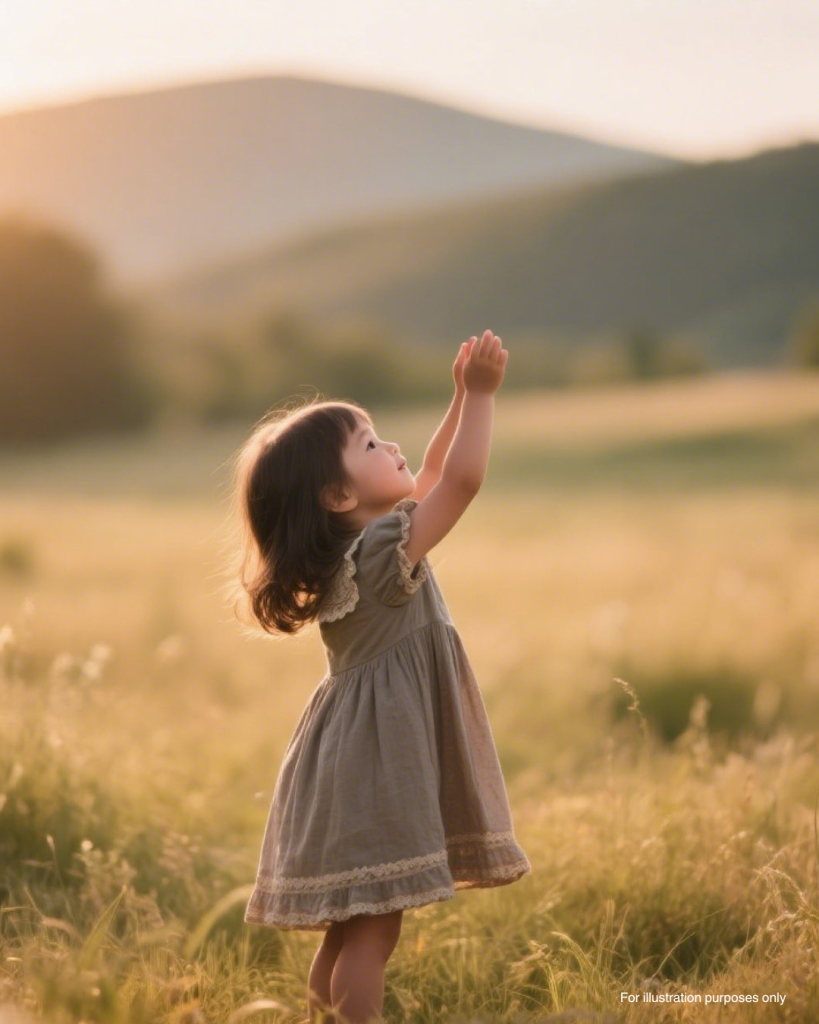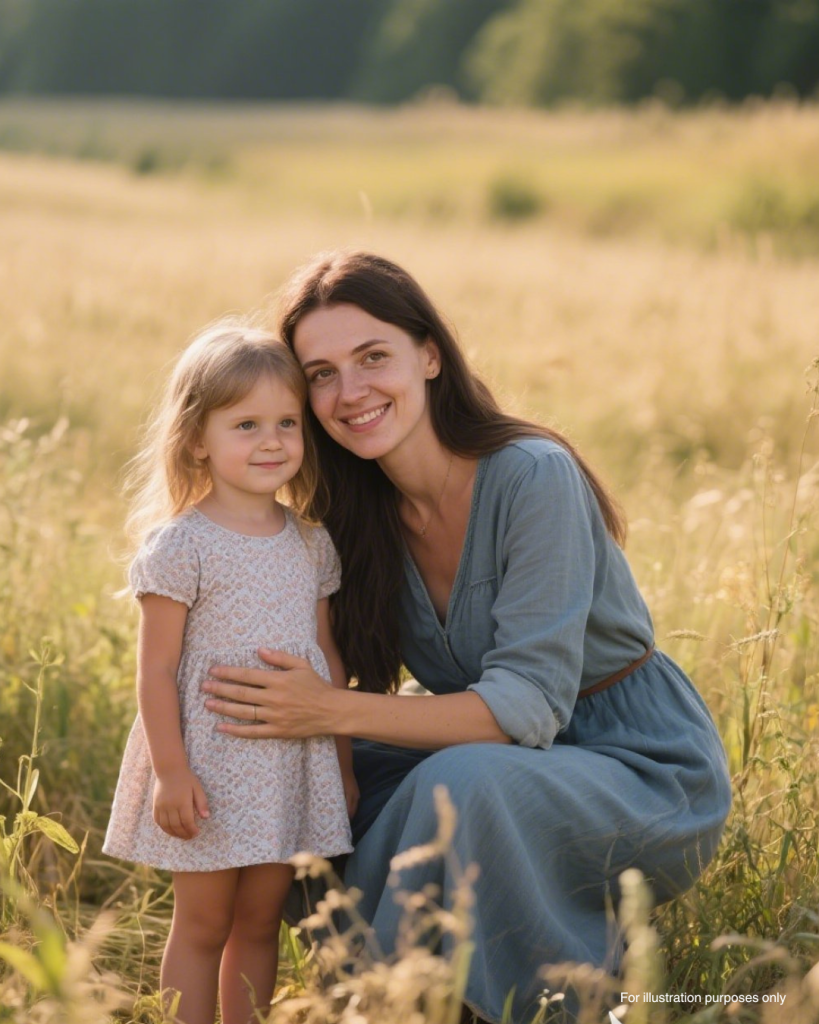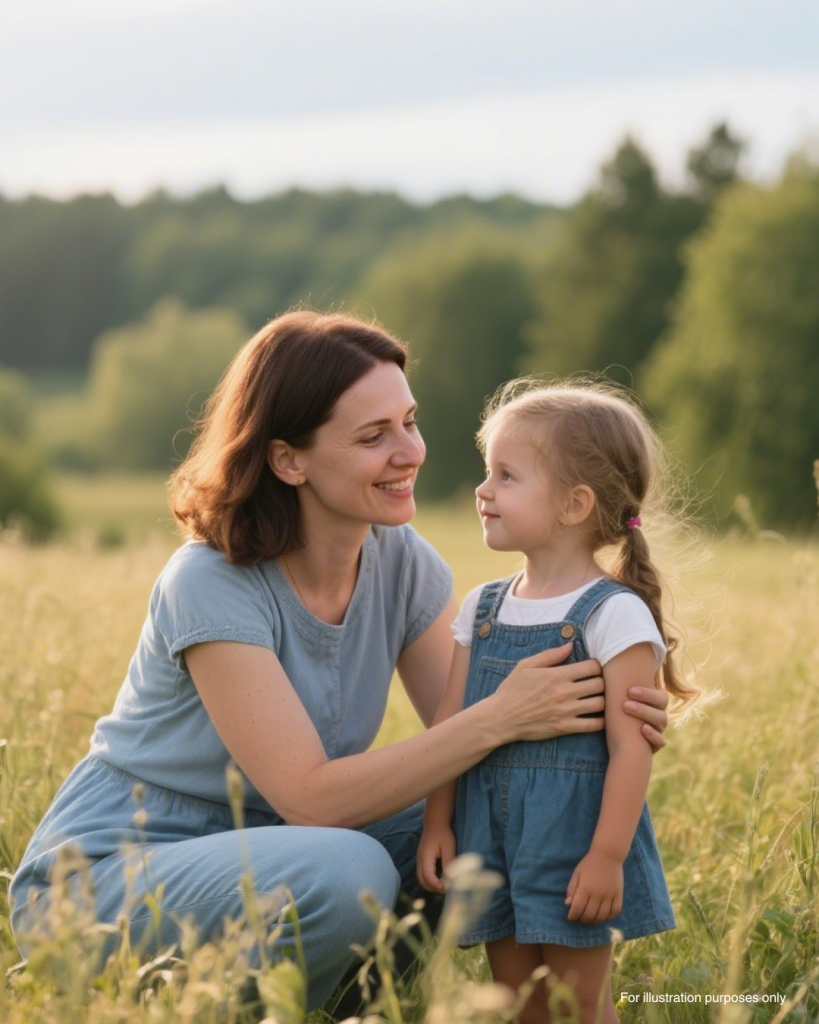“Stop!” I cried out, the sound swallowed by the vastness of the golden field.
But the small figure ahead didn’t turn. She moved slowly, aimlessly, through the wheat as though led by something only she could see.
It was August — dry, blistering, and still. I was walking back from the river with a bucket of wet laundry when I noticed her: a little girl, no older than five, in a threadbare dress. Her movements were sluggish, dreamlike.

“Hey there, sweetheart!” I called, setting down the bucket and hurrying toward her.
She finally turned. Her dark eyes — impossibly large — locked onto mine. They didn’t blink. A long-dried scratch trailed across her cheek.
“What’s your name?” I crouched down, trying to meet her at eye level.
No answer. Only the whisper of wind stirring the wheat around us.
“Where’s your mama?”
Still nothing. But after a beat, she lifted one arm and pointed, vaguely, toward the horizon.
“There’s no one out there, honey. Come with me. I’ll get you something warm to eat.”
Her hand in mine was cold — chillingly cold, despite the heat — but she followed without resistance. Still, she kept glancing over her shoulder, toward the endless golden field.
Ivan was out in the garden, pulling weeds.
“Who’s this?” he asked, brushing dirt off his hands as he stood.
“I found her in the field,” I replied. “All alone. Not a word out of her.”
He walked over, knelt, and pulled a carrot from his pocket. “Want a snack?” he asked gently.
The girl took it and nibbled carefully, like a rabbit uncertain of danger.
“We should probably tell the police,” Ivan murmured.

“After she’s fed and cleaned up,” I said. “She’s in no state for questions.”
In the kitchen, she sat quietly at the table. I poured her milk, placed slices of bread. She ate slowly, with almost eerie precision. Sometimes she paused, head tilted, as if listening for something distant.
“You remember your name?” I asked.
She shook her head.
“Where are you from?”
A vague gesture into the air again. No words.
“Could she be a gypsy child?” Ivan later asked. “There was a caravan a while back.”
“She doesn’t look like one,” I said. “She looks… lost.”
I scrubbed her in the bathhouse, gently washing off the dust of wherever she’d come from. Under the grime, her skin was porcelain pale, her fine hair nearly golden. I dressed her in an old cotton shirt of mine that fell to her ankles.
That evening, Stepanich, the village policeman, came by. He took down everything — her appearance, where I’d found her, her silence.
“No reports of missing children around here. I’ll check with the neighboring districts,” he said. “What should we do in the meantime?”
“She stays with us,” I said, without hesitation.
Ivan nodded.
The girl slept fitfully that night. At some point, she woke up sobbing and ran into our room, burying herself in my arms.
“There, there,” I whispered, holding her close. “You’re safe now.”
As I stroked her hair, she mumbled something — almost too softly to catch.
“Mom…”
My heart clenched.
“A dream?” I whispered. But she was already asleep again.
A week passed, then two. Stepanich kept checking in. No one claimed her. She spoke little, but sometimes we’d hear her whispering in her sleep — words we didn’t recognize, in a language that wasn’t ours.
“Maybe she’s not from here,” Ivan said one evening.
“There are no foreigners out here.”
Still, she started to come alive — slowly. Her cheeks filled out. She smiled once or twice. She even helped collect eggs.
“We need to call her something,” Ivan said.
“What if she remembers her real name?”
“A placeholder, then. Just until she does.”
I studied her face — the golden-flecked eyes, the stubborn little chin. “Katya,” I said softly. “She reminds me of my grandmother.”
The girl smiled. For the first time. A small, flickering smile that made my throat tighten.
Fall rolled in, early and cold. We baptized her Katya and she began to bloom. Her voice grew stronger — first single words, then full phrases. But never anything about where she’d come from.
One chilly morning, she reached for her cup and said: “Water, please… Mom.”
The kettle nearly slipped from my hand.
Ivan quietly turned his head, blinking fast.
By winter, we had filed the papers. The authorities suggested sending her to an orphanage.
“She’s not going anywhere,” Ivan said firmly. “We’ll become her guardians.”
And we did. It wasn’t easy — inspections, forms, questions. Katya clung to my skirt when the officials came. One woman said, “She’s odd. Maybe she needs professional care.”
“No,” I said. “She just needs a home.”
That New Year, the papers were finalized. Katya was ours — officially.
“You’re ours forever,” Ivan said, lifting her in his arms.
“Papa,” she whispered, wrapping her small arms around his neck.
That winter, something shifted. One night I woke and found her standing by the frosted window.
“Katya? Why are you up?”

“They left,” she said quietly. “They won’t come back.”
“Who?”
She turned — her face strangely calm. “I don’t remember. But I know they’re gone.”
She never returned to that window at night again.
Spring brought a new Katya — lively, curious, clever. She learned to read as if she’d always known how. Her drawings were strange though — symbols, spirals, delicate patterns that seemed… familiar, though I couldn’t say why.
“What are these?” I asked once.
“They just come to me.”
When my sister visited from the city, she stared at Katya in shock. “Masha, she looks exactly like you did at her age!”
She was right. The resemblance was uncanny. As though something had chosen us for each other.
“It’s fate,” my sister said. “Meant to be.”
Exactly a year after I found her, Katya woke one morning and said:
“Mom, I remembered.”
“What, darling?”
“That I’ve always belonged to you. I just had to find you first.”
I held her tight, tears soaking her hair.
Years passed quickly. Katya thrived. Smart, kind, full of life. She won competitions, read endlessly, made us proud.
“You need to study in the city,” Ivan said when she was fourteen. “A bright future awaits.”
“But I’ll come back,” she said. “This is home.”
One night, the three of us sat on the porch, watching the sky fade.
“Mom,” Katya asked, “can you tell me again how you found me?”
And I did. I told it like always, and she listened like it was the first time.
“You were five,” I said. “I found you walking through the wheat. And from that moment, you became mine.”
“I see it in my dreams,” she said. “A woman in white says, ‘Go — they’re waiting for you.’ And she points to our field.”
“Maybe an angel,” Ivan said.
“Maybe,” she whispered.
At eighteen, Katya went off to medical school. We saw her off with tears and pride.
She came home every holiday. One winter, she said, “Mom, I met someone. His name’s Sergey. He’s studying to be a doctor too.”
Sergey was kind, thoughtful, steady. A perfect match.
They married in our village. That day, Katya cried tears of joy.
“Thank you,” she whispered. “For everything.”
Two children followed — a boy and a girl. Ivan and Masha. Our names. The circle continued.
When little Ivan turned five, we all went walking through the field. Suddenly he stopped and pointed.
“Mom, there’s a lady in white over there. She’s waving.”
We saw nothing. Just the wheat moving gently.
“She’s saying thank you,” he added.
Katya sat down, pale. She didn’t say much. But something in her settled that day.
That night, we sat on the porch.
“I think I’m remembering,” she told me.
“What do you remember?”
“A feeling. That I was sent here. That I had to find you. Not born from you — but meant for you.”
I said nothing. Just held her close.
“You gave me a family,” she said. “And now I pass that love on.”
We sat in silence, watching the field — that quiet place where our story began.
A girl out of nowhere. A mother who said yes. A family built not by blood, but by love.
And that — that was the real miracle.

